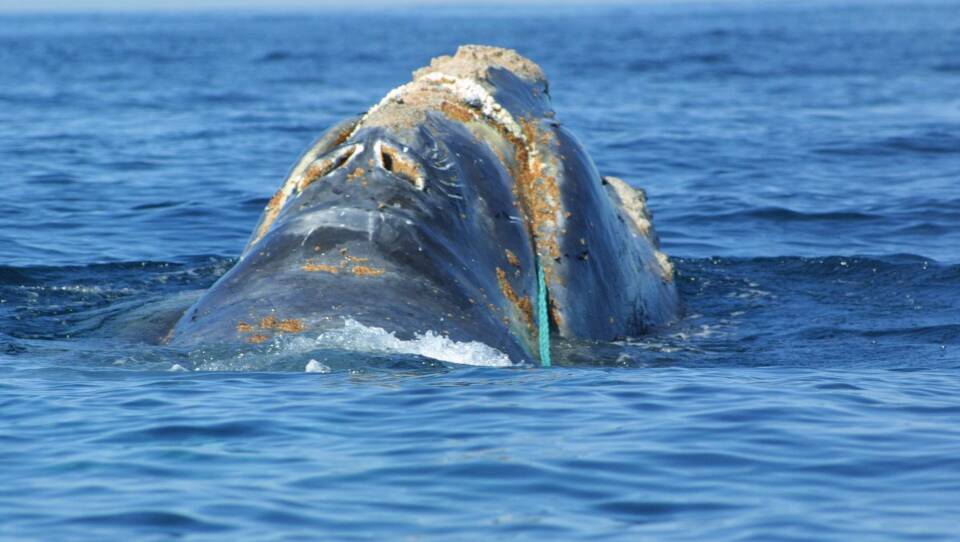The Maine Lobstermen’s Association has won a victory in federal appeals court after suing the U.S. National Marine Fisheries Service over restrictions intended to save the critically endangered North Atlantic right whales, whose small numbers are threatened by entanglement in fishing gear.
The District of Columbia Court of Appeals reversed a lower court on Friday that had favored the federal agency and several conservation groups that backed the restrictions which would limit where lobster fishers can fish and what kind of gear they can use to try to prevent the whales from becoming entangled in fishing ropes. There are only about 340 North Atlantic right whales in the world, and scientists say extinction is a potentially imminent danger.
Charles “Stormy” Mayo, senior scientist at the Center for Coastal Studies in Provincetown, said too many right whales are being injured and killed by being entangled in fishing gear, as well as by boat strikes. And he said, since not enough calves are being born each year to sustain the species, the math is undeniable.
“The trajectory tells us all we need to know: the whales will go extinct,” Mayo told GBH News. “My view of the data is very clear. If we institute changes — and one of the few things we can do is to reduce the mortality of ship strikes and entanglement — then I think this population can come back.”
Mayo said the reversal in federal appeals court stopped the National Marine Fisheries Service from exercising the utmost caution, which he says is scientifically necessary and sound.
Patrice McCarron, policy director with Maine Lobstermen’s Association, told GBH News, that Maine fishermen care deeply about saving right whales, but that they have not been documented in great numbers in Maine waters.
“For the Maine lobster fishery, there has never been a documented death of a right whale linked to Maine lobster gear,” said McCarron. “And the last documented entanglement of a right whale in Maine lobster gear was in 2004. And given these facts, we have continued to further modify our gear, make our fishery safer, including a whole new round of regulations that was aimed to reduce our risk by 60%, all of which was implemented last year in May of 2022."
More Local News
But Mayo countered that data is scarce and inconclusive on the origins of gear involved in whale entanglements. And he added that Maine waters bear watching since the locations and migrational patterns of right whales are both not completely known, and also in flux under the influence of climate change.
The appeals court ruling could mean that the federal government must take another stab at crafting new rules to protect the whales. The restrictions would limit where lobster fishers can fish and what kind of gear they can use to try to prevent the whales from becoming entangled in fishing ropes.
The changes would represent a potential worst-case scenario for the lobster fishing industry, wrote Douglas H. Ginsburg, the senior judge of the appeals court, in the ruling.
“The result may be great physical and human capital destroyed, and thousands of jobs lost, with all the degradation that attends such dislocations,” Ginsburg wrote.
The Boston-based Conservation Law Foundation, one of the groups also sued by the Maine Lobstermen’s Association, in addition to the Nation Marine Fisheries Service, said in a statement:
"Whatever this Court and Congress say, the facts and the science show that U.S. fisheries are killing right whales at grossly unsustainable rates. As inadequate as the 2021 rule is, at least those protections will remain in place for the next 5-6 years. There is no time to waste on transitioning to more sustainable fishing gear and removing vertical lines in the water where necessary."
The National Marine Fisheries Service service declined to comment on the lawsuit.









